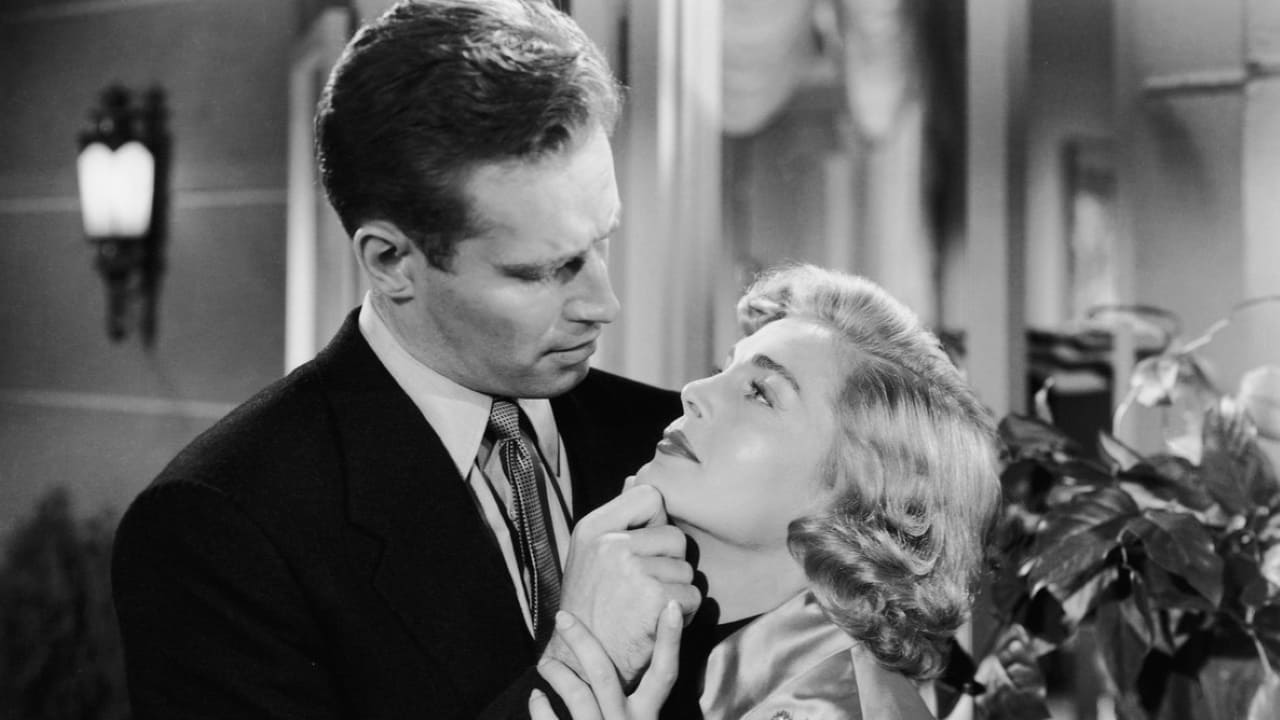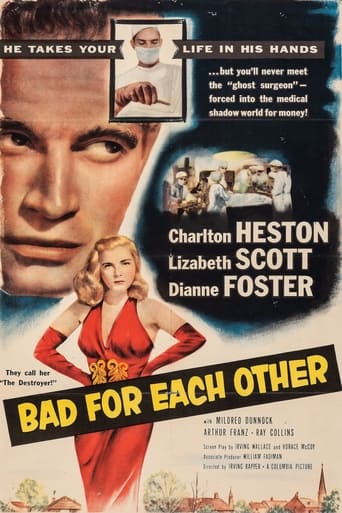

Plot so thin, it passes unnoticed.
... View MoreBetter Late Then Never
... View Moreit is the rare 'crazy' movie that actually has something to say.
... View MoreOne of the film's great tricks is that, for a time, you think it will go down a rabbit hole of unrealistic glorification.
... View MoreA once-idealistic doctor from a small mining town sells his integrity for a big city practice treating wealthy dowagers. If you said to yourself "That sounds like an incredibly dull premise for a noir," give yourself a gold star. Nothing to see here but a bunch of heavy-handed speechifying and simplistic class distinctions. I've never cared for Charlton Heston (with the possible exception of TOUCH OF EVIL) and here he does a lot of jutting out his chin and looking handsome and delivering his lines with zero conviction. Lizabeth Scott is an actress I run hot and cold on... in this case, quite cold. She's entirely uninteresting as a "bad girl" whose primary vice is a mild materialist streak. I was also rather annoyed by Mildred Dunnock, playing Heston's hand-wringing mother. The script is just awful and photographically, the film is a dud, with a few instances of noticeably poor shot continuity (not a deal-breaker, but a pet peeve of mine). There's no tension, no real conflict, no doubt about how everything's going to turn out okay in the end. Bad for you, bad for me, bad for everyone.
... View MoreCharlton Heston and Lizabeth Scott are "Bad for Each Other" in this predictable 1953 film, also starring Mildred Dunnock, Arthur Franz, Marjorie Rambeau, and Dianne Foster. Heston plays a doctor who returns from the service to the coal town where he grew up. After meeting the wealthy, twice-married, shallow Scott, he decides not to stay in the service and becomes a society doctor, in it for the money. The nurse he hires to work for him (Foster) thinks he's better than that. The role played by Arthur Franz, that of a young doctor who admires him and doesn't mind going into the trenches, is essentially Heston's conscience.I found this film pretty bland, but the big problem for me was that the main character as portrayed by Heston was just not likable. He wasn't likable before he took up with Scott nor was he likable throughout the film. Some of this was in the script, but some of it was in his line readings. He had fat attitude every time he opened his mouth. Frankly I didn't care what he did.Lizabeth Scott was best earlier in her career, in her noir days, where her great voice, sexy blond looks, and ambiguous performances fit very well. Her character in this also was annoying. Now, she's not supposed to be likable, but we should have been able to see why Heston liked her. She seemed awfully pushy for his character to have put up with her.Heston was tall, handsome, with a great voice and a dominating presence. This film was unfortunately directed in a somewhat old-fashioned manner so as to seem melodramatic and over the top. When someone with that strong a screen persona is directed that way, his performance becomes too actor-y.Nothing special.
... View MoreUsually my rating comes pretty close to the "group" rating here. But this time I must disagree and give this film a considerably higher "7".I was not expecting much, partially because since Charlton Heston's NRA rants he had fallen out of favor with me, although I still believe his performance in Ben-Hur was one of the great performances in cinematic history. But there have been few other films I really enjoyed him in. But, Heston's performance here is top notchAs one other reviewer here pointed out, it isn't far into the film before we know that the basic plot is that a doctor who is tempted to a rich practice for hypochondriacs will, eventually, return to his true calling. Okay, but then again, we figure out the gist of most movies pretty quickly. What makes a film interesting is the way it gets to a conclusion we've already figured out. On the one hand, some aspects of the story -- such as the coal mining aspect -- are a little different. There are also some aspects of the film that just don't ring true...such as the mother's reluctance to have her son be successful; that is a bit overdone. And, I don't think the screenwriters did Lizabeth Scott's role any favors; she's too callous. But, at least she's interesting here. Dianne Foster as a dedicated nurse was good, and it's always nice to see Mildred Dunnock (here as the mother; too bad the role was not more realistic). Arthur Franz is excellent as a dedicated young doctor. It's always a plus to have veteran character actor Ray Collins in a film, and he is wonderful as ever here. Same for Marjorie Rambeau as a rich, matronly type. Lester Matthews and Rhys Williams do fine as a slick city-type doctor versus a country doctor.So, from my perspective, this is a pretty decent movie. Perhaps not one for the DVD shelf, but definitely worth a watch (or two...as I did).
... View MoreMost of the other comments on this tale have been pretty much on the mark. It's a "medical soap opera." And it's a permutation of "Not As a Stranger." After twelve years in the Army, Chuck Heston is a full colonel in the Medical Corps who returns for a visit to his home town of Coalville, Pennsylvania, just outside of Pittsburgh. It's a shabby mining town full of poor laborers and the only doctor in Rhys Williams who doesn't earn enough to own a private jet that can fly him to Cancun for a winter tan.Chuck is disgusted by the place. But when he meets a society doctor, Lester Mathews, in Pittsburgh, and especially when he meets the husky-voiced Lizabeth Scott, daughter of the man who owns the mines in Coalville, he's seduced into leaving the Army, working as an associate for Doctor Croesus in Pittsburgh, and becoming engaged to the enormously wealthy but self-indulgent Scott.Soon he has just about everything he wants, including an extremely efficient and highly educated nurse, Dianne Foster, who is given to needling him for becoming Mathews' "ghost surgeon" and for treating adjustment disorders of the rich instead of the suppurating illnesses of the poor minors in Coalville.There's been criticism of the social structure painted in this film -- nothing but the hypochondriacal wealthy who come only to flirt with the glamorous doc, versus the smudged minors and their families who REALLY get sick. And it DOES seem a little like propaganda because, after all, the rich get sick just like the poor. Yet, we should remember that the wealthy can afford to get treatment for less threatening disorders like headaches, while the uninsured poor are liable to lug themselves to a doc only when their bones are broken. Ergo: A disproportionate number of rich patients with minor complaints, with a disproportionate number of poor people with life-threatening disorders. There are a couple of sub-plots involving an idealistic young colleague of Chuck's, Arthur Franz; another about Chuck's brother having been miscreant; and something about a mysterious shadow that shows up on the lungs of miners in Essen, Germany, and Coalville, Pennsylvania. The lung disease business is dropped. The Franz thread leads to a payoff in which Chuck throws away his financial security and goes back to do the work every semi-sophisticated viewer always knew he would do. He gives up the clinging and demanding Liz Scott too, and the last shot is of Chuck and his efficient nurse in his Coalville office, staring starry-eyed at one another. I admired both characters, not because they turned out to be good but because they were both educated at the University of Pennsylvania where I too had some classes.This was written by Horace McCoy, whose novel, "They Shoot Horses, Don't They?", was a study in despair and that was later turned into a decent exploration of human endurance. I've never read the novel but you'd never know McCoy was a good writer if you judged his talent on the basis of this film alone.Chuck's status is in-your-face emphatic. Everybody calls him "Colonel" and then everybody calls him "doctor." Doctors call each other "doctor", even in casual conversation. The doctors call friends by their nicknames and subordinates by their last names. Chuck's nurse is "Lasher", not "Joan." I counted, and the word "doctor" is used exactly eleven-thousand, four-hundred and three times. It recalls the old joke: What's the difference between God and a doctor? God doesn't think he's a doctor. That, in turn, reminds me of another old joke: What's the difference between a vitamin and a hormone? You can make a vitamin. Yes, it's a long road that has no turning. I don't know what that means but it sounds awfully proverbial to me.Now, we return to our movie. What was it again? Yes, that's right. Nurse, hand me a fresh Ostwald viscometer, will you? Lizabeth Scott is urging Chuck to accept a partnership with Mathews. By this time Mathews has been exposed as a kind of suave but incompetent front man and Chuck is treating the long line of society matrons waiting to have a swelling excised from their wallets. Foster is urging him to rediscover his idealism. He plumps for the dough until a mine explosion reeducates and revitalizes him, after which he leaves Liz Scott for sooty Coalville.Chuck seems to have been finding his feet when he made this. Some of his movements seem awkward and strained, though he's a magnetic presence on the screen. Being ten feet tall and sounding like Ezio Pinza helps. Liz Scott delivers a standard Hollywood performance. When she has something Big to import, she stands slightly bent at the waist, her elbows crooked at her side. Her acting is as shallow as her character. Only God, my dear, could love you for yourself alone and not your yellow hair. I've never seen a man adopt such a stance, and women only do it in the movies. Dianne Foster uses it too, so it must be mere convention. I give Foster a pass on it, though, because she's so bright eyed and so supportive of Chuck as he wrestles with these conflicts. Also Foster's voice doesn't sound as if it had been subjected to half a lifetime of being cured by the smoke of Gaulois. It sort of tinkles.At heart, this is a dumb and obvious movie, yet I kind of enjoyed it. There's a lot of talk, true, but the plot is so simple as to fall just short of simple mindedness. You already KNOW what's going to happen. A good man, led astray, will be saved through the sacrifice of another and the love of a good woman. Soothing and palliative, your troubles melt away.
... View More